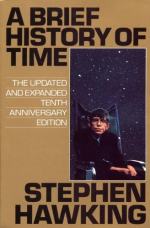
|
| Name: _________________________ | Period: ___________________ |
This test consists of 5 multiple choice questions, 5 short answer questions, and 10 short essay questions.
Multiple Choice Questions
1. Which virtual particle carries the electromagnetic force?
(a) Magnetron.
(b) Electron.
(c) Photon.
(d) Proton.
2. When Hubble discovered other galaxies, in what direction were they moving?
(a) Towards each other.
(b) Away from each other.
(c) Towards earth.
(d) Away from earth.
3. Edwin Hubble's observation that the universe is expanding supports what theory?
(a) The Dark Bang theory.
(b) The Dark Matter theory.
(c) The Universe Expansion theory.
(d) The Big Bang theory.
4. A location on earth's surface is defined by what?
(a) Longitude, latitude and altitude.
(b) Height, width and depth.
(c) Altitude, degree and time.
(d) Location, time and depth.
5. The disease Stephen Hawking has affects what?
(a) His ability to reason.
(b) His mind.
(c) His body.
(d) His emotions.
Short Answer Questions
1. What does a particle with 0 spin look like?
2. What type of theories try to bring the various virtual particles together as one entity, but do not include gravity?
3. Scientists try to create explanations for the way the universe works that always do what?
4. How does Hawking define scientific theory?
5. Who discovered the theory of gravity?
Short Essay Questions
1. According to Carl Sagan, what prompts children to ask seemingly unanswerable questions?
2. How did Einstein observe Brownian motion?
3. Why do scientists think that there is a black hole in the star system Cygnus X-1?
4. What happens at the event horizon of a black hole?
5. What do religious explanations to fundamental questions of the universe reveal?
6. What is the relationship between quantum mechanics and predictions?
7. What are quanta?
8. What are the six varieties of quarks?
9. What was the Ancient Greek view of the universe?
10. Why might our present day ways of thinking about the universe seem ridiculous in the future?
|
This section contains 519 words (approx. 2 pages at 300 words per page) |

|




